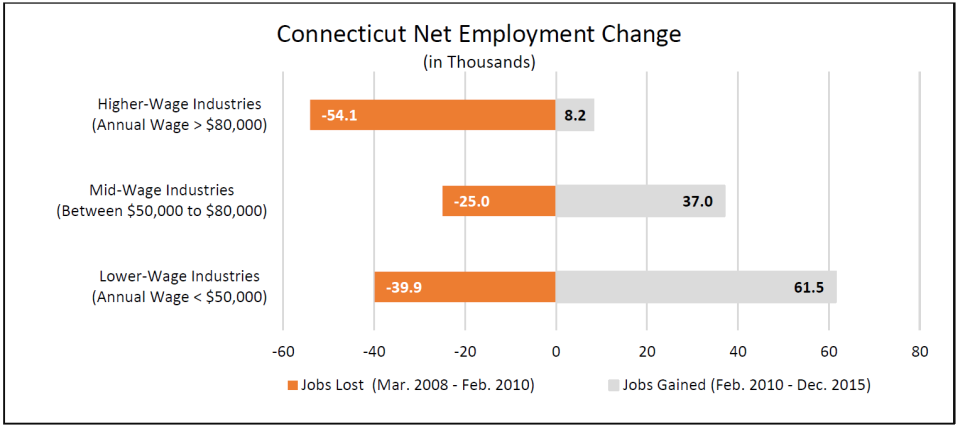Confronting the ‘Jobs Swap’
Connecticut continues to be whipsawed by economic news.
First, Pratt & Whitney announced it will add up to 8,000 new jobs in Connecticut over the next decade.

Source: Connecticut Office of Policy and Management.
And a day later, Lockheed Martin committed to building Sikorsky’s new CH-53K King Stallion helicopters in Connecticut, impacting about 8,000 current and new jobs.
It was quite the five-day ride, reinforcing the need to build more steadiness and predictability throughout the state’s job market.
Stubborn Growth
Job growth is stubbornly slow. Connecticut’s recovered just eight jobs for every 10 lost during the 2008-2010 recession.
And there finally seems to be widespread recognition that the lion’s share of new jobs are not as high-paying as the ones they’re replacing.
Governor Malloy was among the first to call out this “new economic reality” in his budget address last February.
CBIA and others have echoed it, and finally this month the progressive-leaning Connecticut Voices for Children came to the same realization.
High-wage industry jobs are shrinking in Connecticut, while employment in low-wage industries is growing.
Voices for Children aptly named this phenomenon the “jobs swap.” And not only does the jobs swap drain family earning power, it has a cascading impact, reducing consumer spending and eroding tax revenues.
So now that we have all recognized the problem, it’s high time to work on a solution that will fortify our economic base with higher paying jobs.
Medieval Medicine
This is not a challenge unique to Connecticut, but the path that Voices is advocating is alarming.
Rather than follow neighboring states like Massachusetts, New York, and Rhode Island in reducing business costs and stabilizing their state budgets as Malloy urged with last May’s deficit mitigation package, Voices prescribes the medieval medicine of a $15 minimum wage, which would sap—not bolster—job recovery.
These wage proposals, promoted as a way of helping workers, actually kill entry-level jobs and destroy the path to better jobs for less-skilled workers.
As I have pointed out in this space, requiring that employers pay a higher wage does not magically provide them with the money to do so.
These proposals, promoted as a way of helping workers, actually kill entry-level jobs and destroy the path to better jobs.
The bottom line: We have finally come to a common understanding of the problem.
Let’s find unifying approaches to solving it:
- No anti-business legislation
- A thorough regulatory review to alleviate unnecessary burdens
- No new taxes—better yet, tax cuts for investment and good job creation
- A completely new attitude—to welcome business growth.
Let’s fix Connecticut. Let’s add jobs to the our workforce.
Thankfully, there are Republicans and Democrats who both seem to be urging this direction as Election Day nears.
Pete Gioia is an economist with CBIA. Follow him on Twitter @CTEconomist.
RELATED
EXPLORE BY CATEGORY
Stay Connected with CBIA News Digests
The latest news and information delivered directly to your inbox.


